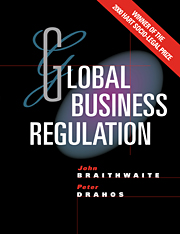21 - Contests of Principles
Published online by Cambridge University Press: 04 August 2020
Summary
Principles have played no role in the globalization of business regulation. Had this been our hypothesis it would have turned out to be false. In every domain we have investigated we have found that actors have supported some principles and opposed others, using principles to do so. Contests of principles are a key phenomenon in the process of the globalization of business regulation. This finding requires an analysis of their role, the purpose of this chapter.
The chapter is written in two parts. The first identifies those principles that have been entrenched in business regulation and those that have not. The second part looks at principles more abstractly. Drawing on the findings of the first part, it identifies the characteristics of principles in aggregate (e.g. they can be active or passive) and explores relations between principles (e.g. principles can be co-active or oppositional). This analysis of principles sets the stage for a processual theory of forum-shifting to enact contests of principles over how regulation should globalize, presented in Chapters 23 and 24.
Contests
Triumph of Transparency
Of all the principles we have surveyed, transparency has been the one which has most consistently strengthened in importance. The only domain in which we found it weakly present was air transport and even there it is strengthening somewhat (see Table 21.1) In nuclear regulation, although strengthening, transparency has a somewhat restricted operation. Transparency is at its strongest in the domains of finance, corporations and securities, so much so that we depicted one shift in capitalism as being a shift from an insider network capitalism to a global transparency capitalism. Within finance, transparency has a sister principle, that of consolidation. Consolidation requires the total supervisory coverage of a firm's financial affairs, which a transparency of financial affairs enables. Transparency is also a principle which has become entrenched in some regulatory domains by means of law. It is, for example, a general obligation in the General Agreement on Trade in Services (GATS) and the Agreement on Trade-Related Aspects of Intellectual Property Rights (TRIPS). Transparency obligations are dotted throughout the Final Act Embodying the Results of the Uruguay Round of Multilateral Trade Negotiations (Final Act) and they also feature in regional agreements like the North American Free Trade Agreement (NAFTA).
Information
- Type
- Chapter
- Information
- Global Business Regulation , pp. 507 - 531Publisher: Cambridge University PressPrint publication year: 2000
